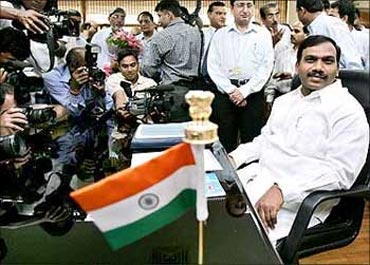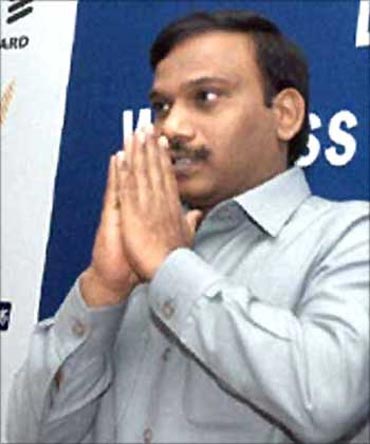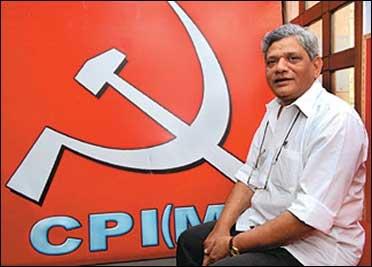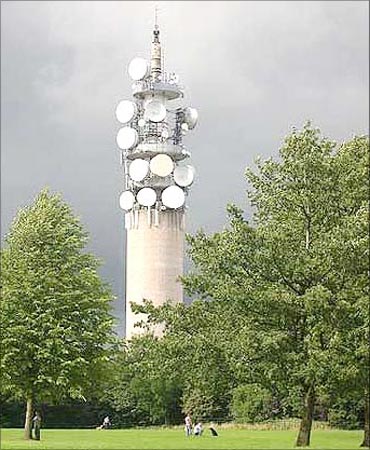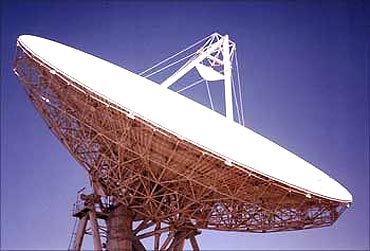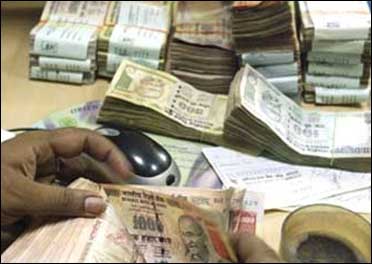 | « Back to article | Print this article |
Rs 1,70,000 crore 2G scam: CAG nails A Raja
The report also slams TRAI for being a 'helpless spectator'. It also indicts the Department of Telecom for flouting eligibility norms.
Click NEXT to read on...
Rs 170,000 crore 2G scam: CAG nails Raja
"You (CBI) have not done anything. The matter is serious. The same minister is still continuing today. Is that the way the government functions?" the Supreme Court asked.
When asked about the SC report, "I do not want to talk on whatever happened in the Supreme Court as the matter is now sub-judice and it is not proper for me to comment," Prime Minister Manmohan Singh said.
Click NEXT to read on...
Rs 170,000 crore 2G scam: CAG nails Raja
Alleging that the exchequer has lost a staggering Rs 190,000 crore (Rs 1.9 trillion from the 2G spectrum), senior CPI (M) leader Sitaram Yechury said the issue of 2G spectrum licence to private telcos "lacked" fairness and transparency.
"If we use the recent 3G auction price to benchmark the spectrum price for 2G as Trai has recently suggested, the loss is of the order of a whopping Rs 190,000 crore," Yechury said, adding Raja's argument that 2G was priced at a low Rs 1,650 crore (Rs 16.5 billion) per operator with a view to keep the prices of services to the consumer low "does not hold water".
Click NEXT to read on...
Rs 170,000 crore 2G scam: CAG nails Raja
Calling it the largest scam in independent India, the Bharatiya Janata Party in 2009 said there were irregularities in allotting wireless radio spectrum and licences by the telecom ministry to nine private operators in 2007.
The government had in 2007 recommended an 'open licence regime'. "Applications for telecom licences were invited setting Oct 1, 2007, as the deadline. An artificial cut-off date, Sep 25, 2007, was created and applications received between Sep 25 and Oct 1 were summarily rejected. Rules of the game were changed after the game had begun," the BJP charged.
Click NEXT to read on
Rs 170,000 crore 2G scam: CAG nails Raja
The licences and the spectrum allocation were then allotted to nine operators at a price of Rs 1,650 crore (Rs 16.50 billion) per operator. This price was not taken on the basis of the 2007 market value but on the basis of an auction held in 2001.
The value of the licence and spectrum in 2007 could not be the same as in 2001 as the telecom market has grown phenomenally during this period.
Click NEXT to read on
Rs 170,000 crore 2G scam: CAG nails Raja
However, Raja has continued to refute allegations of wrongdoing and also denied his role in a telecom spectrum scam.
He stated that the licenses and spectrum had been allocated in conformity with the government's telecom policy.
Click NEXT to read on
Rs 170,000 crore 2G scam: CAG nails Raja
Chennai-based STel group allegedly sold 49 per cent to Betel for nearly $225 million, while Shyam Teleservices sold 70 per cent to the Russian firm Sistema.
The government allowed new licensees to sell their stake without any roll-out obligations. Raja is now attempting to dilute the issue by a fresh three-year lock-in period clause.
Turkcell, a leading Turkish telecom company and Europe's third largest operator, is in talks to buy 51 per cent stake in Datacom Solutions. The CPI(M) has pointed out promoters of the companies allocated spectrum on 'first come first served' basis are either unknown or shadow companies or even real estate firms!
